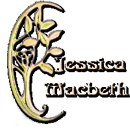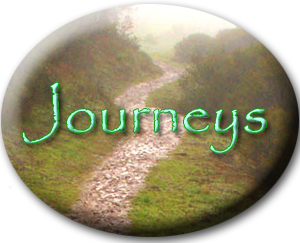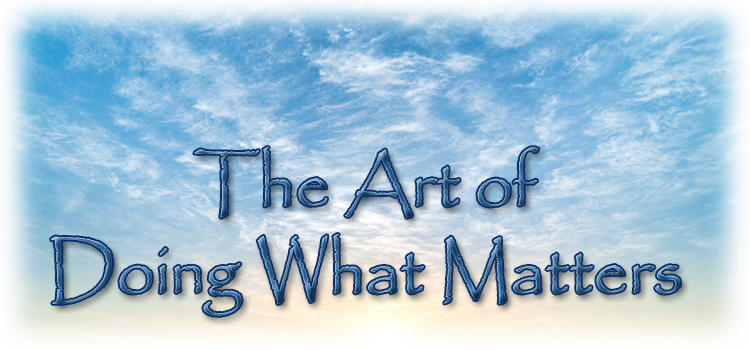
The Hindus call it dharma, and according to Depak Chopra, it means to know your purpose in life and to fulfill that purpose. We all share the common purpose of growing and moving toward fulfilling our potential for a creative, constructive, and satisfying presence in the world. However, in order to fulfill our dharma, to practice the art of doing what matters, we need to be doing something that provides a service of some kind to others, and that service must contain within it a space for us to grow. So the Art of Doing What Matters contains two equally important concepts: service to others and growth potential for ourselves. Virtually any work we might choose can meet the requirement for personal and spiritual growth if we are trying to live consciously and to pay attention to the lessons the universe is offering us. So that part is simple (ha!), and we can chose anything that suits us, anything that we feel a calling to, a vocation for. It just needs to provide a useful service for others. Our art might be practiced and fulfilled by being plumbers, painters, phytopathologists, paralegals, paramedics, pedagogues, papyrus makers, potters, priests, paladins, palaeoclimatologists, palmists, peddlers, pharmacists, philologists, porters, philosophers, or pianists — to name only a very few of our very many possibilities. Here, I'm going to assume that you want to be one of the harder ones, say something usually considered to be spiritual (like healing or spiritual counselling) or creative (like painting or music or writing). These are generally hard because there are not many jobs with a regular paycheck for such work, and you may have to somehow convince people they need what you want to do enough to pay for it — and you probably have to do that over and over with new people. Clients only have room for so many paintings, only need so many therapy sessions — and as far as the healing arts are concerned, the better you are, they fewer they may need. There are a lot of challenges in creating a professional practice. Here are some of the things I learned in doing so. The idea of service is something we may need to think about first. Sometimes alternative and complementary practitioners seem to expect that they 'should' be able to do what they want to do, without consideration of whether or not anyone wants to be on the receiving end. The thought seems to run something like: I am a good, spiritual person doing good, spiritual things, and people should support me in this because it's good for them too. I have learned to be wary of people who say should (including myself), especially about other people's actions. If no one wants it, it isn't a service. Let's say you want to be a zibbletherapist. No one knows what a zibbletherapist is or does, so only the severely deranged are likely to phone for an appointment. You have two choices here. You can give up, or you can take steps to educate the public — write articles, give free lectures and demonstrations, hand out leaflets on the street corner — whatever seems appropriate and workable. Let us further say that zibbletherapy is a form of healing in which the therapist nibbles the client's fingernails and sings to his or her toes. This is a very specialized form of therapy (so specialized that even I have never heard of it), and there may not be a big market for it unless you can demonstrate to people that it is really effective. If you are quite certain that it's a good thing, it would be worth trying all of the educational public relations activities (especially free demonstrations) that you can. We can't expect uninformed people to buy something just because we think it would be good for them, but it's surprising how many alternative and complementary practitioners do seem to expect just that. If zibbletherapy works, and if you are a good zibbletherapist, you probably can make a career of it. However, if zibbletherapy doesn't work or if you are a substandard zibbletherapist or if zibbletherapy doesn't promote your own personal and spiritual growth, you won't be able to sell it or yourself. These, then, are the fundamental criteria for the Art of Doing What Matters: The work you offer has to be a service. It has to provide something worthwhile for people. They must both want and need it. It doesn't matter whether the need is one of the body (food, housing, healing etc.) or one of the spirit (art, music, counselling, etc.) — but both the need and the desire (willingness to buy) must be there. The work you do, if it is something like healing or spiritual counselling, has to enhance your own personal and spiritual growth. If it doesn't meet the needs of your present stage of growth, a kindly universe will try to encourage you into another line of work — often by refusing to provide clients. We cannot do our work just for our bosses or our clients, nor can we do it just for ourselves. It has to balance. The Art of Doing What Matters — A Personal View When I was three, and people asked me what I wanted to be when I grew up, my answer was, "A grandmother and a doctor." The problem was one of vocabulary — I wanted to be a wise woman, who healed in a magical way through touch and presence — like my grandmother. My self-chosen purpose in life, my personal doing of what mattered, was to try to be a healing presence in the world, and I already had a sense of how I wanted to go about this. I suspect that many of us were clear about our path in those very early years, but we simply didn't have the words to express it. And then we often got distracted by other people's stories. Like most of us, I got confused about this. I stuck with the notion of being a doctor until I was old enough to understand what doctors really did. What doctors do is necessary and important, but it wasn't what I wanted to do. Then, I thought I might like to be a nurse until I understood what nurses really did. Same problem. Then I thought I might like to be a psychotherapist, but in those days psychotherapy was all behaviorism and rats in mazes and no-consciousness, and that certainly wasn't what I wanted either. So I got married, worked as a secretary, became a mother, got involved with designing, building, and crewing on yachts, got divorced, became a house and sign painter, sold antiques, got married again, worked on boats some more, ran an antiquarian book business, got divorced again (slow learner), acquired a BA in psychology (special interests: counseling psychology, studies in consciousness, altered states, biofeedback, and parapsychology) with minors in anthropology (special interest: comparative religions) and philosophy (special interest: what's it all about anyway?), and finally officially became a minister (of a highly unorthodox [some would say heretical] religious order). And now I'm making yet another shift to put the emphasis on writing and art — but it is still a form of healing. In the meantime, from about the age of three onward I was practicing healing by laying on of hands, initially learned by watching my grandmother heal. In my thirties, I started teaching healing while I learned more things — meditation, massage, shiatsu, astrology, imagery work and other related and unrelated theories, concepts, and skills. Then one evening in my early forties, I was standing on a hillside, under a full moon, performing a wedding ceremony. We were using a large stone for an altar, where I had placed a special candle. The bride and the groom had each carried a lit candle up to the altar, and with those they lit the big candle at the beginning of the service. Near the end of the ceremony family and friends came to the altar one by one to wish them well, offer a piece of advice, or say whatever they felt moved to say. As they did this, each one was given a candle, which had been lit from the large one, by the couple. Finally, everyone was standing in silence, holding the burning candles under the moon and the stars, light over light over light, while I held and blessed the wedding rings. I suddenly realized with an electric sense of shock that I was actually, in that moment, doing what I had wanted to do when I was three. And that my work, every aspect of it — healing, teaching, counselling, ministering, fit neatly into what I had really intended all those years ago. I had blundered into my chosen art without noticing where I was going. I was just doing what seemed appropriate for the moment. I suspect that each of us is walking on our path. I suspect that it isn't possible to get off of it — that everything we do, everything we learn, every experience we have is grist for the mill. But it does help — or at least it is comforting — to know what that purpose is — and that requires conscious examination and awareness of what we are doing. At this time, I'm noticing that my path is changing, moving into unfamiliar territory — or maybe it's familiar but in a different guise. I've been trundling around, doing more or less the same sorts of things, for a number of years now. Of course, I've been learning and growing and expanding what I do, but it has been essentially the same. Now, things are shifting (not because I decided they ought, but simply because they are) and I really wonder: what's happening? What's next? I've talked to a couple of good astrologers and to some psychics and the general message seems to be something like, "Wow, this is interesting! Things are really changing for you." Indeed. Thanks a bunch. So the message from the universe seems to be 'wait and see'. I've been in this position before where I've known change is coming, but not what change. I keep saying that, if I knew what the universe wants me to do, I'd get on with doing it. But this is dodging the issue. What the universe "wants me to do" is to consciously and prayerfully work through the process of change. At this moment, the change seems to be becoming clear, and it is a simple one. My vocation is becoming my avocation, and my avocation is becoming my vocation. Just a change of emphasis. Process As Art, Art As Process There are some questions I've been asking myself to try to clarify this process, and if you are experiencing the same kind of inner searching, some of them may help you. They are:
These and related questions may help us to assess our present (or intended) work for doing-what-matters appropriateness. You may need to invent some more questions for yourself here. People get confused about this. They think that one has to be doing something 'spiritual' in order to be growing spiritually through one's work. Not true. Anyone who is doing anything — a carpenter, a mechanic, an accountant, a priest — and doing it ethically and with compassion is providing a spiritual service and also an example for others. We simply have to be consciously providing a service and being conscious of our intentions, our actions, and their consequences. We need to be learning from and examining our lives as we live them. Being a priest, conducting ceremony and ritual, preaching and healing is no more 'spiritual' than being a bookseller or a financial advisor. Any work can be done sleepwalking or consciously. Consciousness, self-awareness, self-examination, prayer, dedication, devotion, surrender, and awareness of the process are all prerequisites for the spiritual life. As the cliche says, it isn't so much what you do, but how you do it that matters. All right, I accept (reluctantly) that I am in the process of change, that this process is in itself part of my work, and that consciousness is required. I quite understand that sometimes we just have to go through the process and not try to find shortcuts, but I am a person who likes to have a plan, and judging by the number of people who ask, 'But what am I meant to be doing?' many other people would also like to have plans. Or perhaps it's just that we think we should have one. I suspect that sometimes a plan is helpful, and some times it is a hindrance. The trick is in knowing which is which. And in getting on with our work in the meantime, consciously learning, consciously being of service. I wish you well on your journey. And I would just note here that shortly after originally I wrote this, the Universe decided to take drastic action, which I tell about in Waiting at the Gate in the Bio section. The Universe apparently waits only just so long before it Does What Matters. I kept procrastinating, but hopefully I know better now — at least, I'd better because this is another time of change for a lot of us and there is much work to do.
Copyright ©1995 & 2018 by Jessica Macbeth. All rights reserved.
|
|||||


